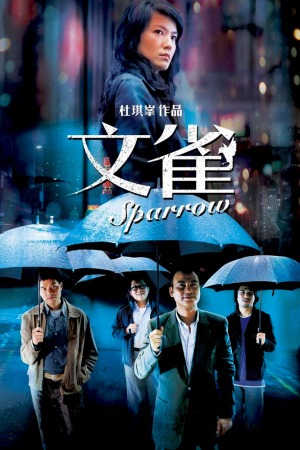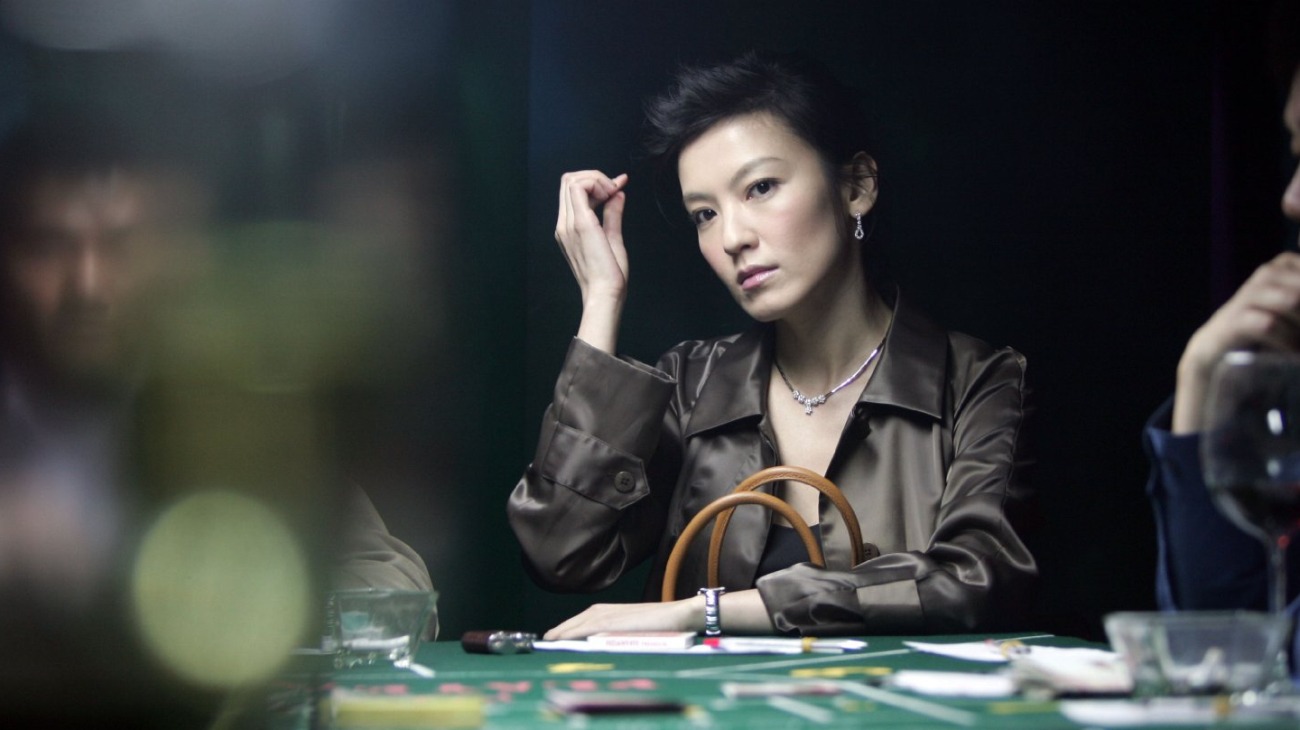
The 44th Chicago International Film Festival
Having seen only his 2006 gangster-western Exiled hardly makes me anything like a specialist on director Johnnie To, but even with that limited knowledge it's hard not to see what makes that film like his newest, Sparrow. Both films are, on paper, rough-and-tumble crime pictures about the travails affecting a group of friends who get involved in a caper that goes south after someone outside the group proves to have a Dark Secret, but both films, in execution, are much more poetic and impressionistic than anything so simple as "gangster picture" could possibly communicate.
Sparrow - its title derived from a slang word for pickpockets, as well as the very literal sparrow that flies into the main character's apartment one day, as a harbinger of things to come both good and ill - centers on Kei (Simon Yam),the de facto leader of a group of pickpockets. We first meet these four men in one of the film's three great setpieces, a lengthy sequence in (if my memory is correct) one take that shows them in their element, effortlessly bumping into random folks on the street, lifting their wallets and handing them off in a delicately choreographed display of crime that feels much closer to ballet than anything we might traditionally associate with Hong Kong action pictures.
Ballet is a handy word to keep in mind throughout the film, which plays out with the light energy of a dance for most of its brisk, sub-90-minute running time. It can't be an accident that music has such a presence in the film, in the form of Fred Avril and Xavier Jamaux's instantly iconic jazz score, feeling a bit like what might have happened if Duke Ellington had been commissioned to write music for the French New Wave. It's one of the most perfect marriages of soundtrack and narrative that I've seen anywhere this year, giving the film a shiny, cool attitude and telling us in the space of just a few notes, "Don't take this seriously - we're just noodling around a bit. Have fun."
And the movie is more than a little fun at that, a caper with enough twists that it's actually pretty hard to figure out where things are going when we, and the boys, meet Chun-Lei (Kelly Lin), a pretty femme fatale who attracts the attention of Kei's ever-present camera (Yam is apparently noted for his photography in Hong Kong, and this character detail is thus something of an inside joke), leading to a lengthy pas de deux as the pickpocket tries to chat up the young woman, who alternates between standoffish and approachable in just the right mixture to seem completely irresistible.
It's a big change from Exiled, where the plot was hardly as important as what the plot enabled, although Sparrow is still more memorable for its visuals than its story. I mean this in a good way. The spirit of the ballet comes back in a major way twice: first during a cigarette-sharing scene that has quite possibly the most beautiful shot of a lipstick-stained cigarette butt that has ever been captured on film, and second in a jaw-dropping mass pickpocketing scene almost at the very end. In the pouring rain, two small armies of men in suits with umbrellas advance towards each other in well-placed slow motion, determined to prove who is the greatest of all thieves. This sequence is one of the great triumphs of the cinema in 2008, a marvelous combination of movement and imagery that must be seen, not described (as if you could describe what a visual poem feels like, anyway). To's genius is in the fact that he seems to genuinely not care about the usual gangster movie trappings of men testing their mettle in high-stakes competition, but in just the sheer visceral impact of watching rain slide off of a spinning umbrella in perfect spirals, spreading out like the arms of a galaxy, an image that vies with that lipstick shot as the most impeccable beautiful in the film.
This is exactly why people like me adore genre films. You can't put a slow-motion pickpocket ballet in the rain in e.g. a prestigious Oscarbaiting literary adaptation, and that's entirely to the detriment of the prestige picture. Sometimes, cinema just has to be about the perfection of a moment's image, whether the film itself says volumes about the human condition or not - and I'm not sure that Sparrow doesn't, so much as that as I write these words, I don't care. Certainly, the final scene of the film is bittersweet and somewhat joyful - though it's hard to say that our heroes have won anything in particular, they're very happy with the way things have ended up, free to continue as they have before. I take it as a comfort to know that somewhere in some place that we'll never see, they're still dancing their ballet of crime, gliding through the streets of Hong Kong with the effortless fluidity of a bird in flight.
8/10
Sparrow - its title derived from a slang word for pickpockets, as well as the very literal sparrow that flies into the main character's apartment one day, as a harbinger of things to come both good and ill - centers on Kei (Simon Yam),the de facto leader of a group of pickpockets. We first meet these four men in one of the film's three great setpieces, a lengthy sequence in (if my memory is correct) one take that shows them in their element, effortlessly bumping into random folks on the street, lifting their wallets and handing them off in a delicately choreographed display of crime that feels much closer to ballet than anything we might traditionally associate with Hong Kong action pictures.
Ballet is a handy word to keep in mind throughout the film, which plays out with the light energy of a dance for most of its brisk, sub-90-minute running time. It can't be an accident that music has such a presence in the film, in the form of Fred Avril and Xavier Jamaux's instantly iconic jazz score, feeling a bit like what might have happened if Duke Ellington had been commissioned to write music for the French New Wave. It's one of the most perfect marriages of soundtrack and narrative that I've seen anywhere this year, giving the film a shiny, cool attitude and telling us in the space of just a few notes, "Don't take this seriously - we're just noodling around a bit. Have fun."
And the movie is more than a little fun at that, a caper with enough twists that it's actually pretty hard to figure out where things are going when we, and the boys, meet Chun-Lei (Kelly Lin), a pretty femme fatale who attracts the attention of Kei's ever-present camera (Yam is apparently noted for his photography in Hong Kong, and this character detail is thus something of an inside joke), leading to a lengthy pas de deux as the pickpocket tries to chat up the young woman, who alternates between standoffish and approachable in just the right mixture to seem completely irresistible.
It's a big change from Exiled, where the plot was hardly as important as what the plot enabled, although Sparrow is still more memorable for its visuals than its story. I mean this in a good way. The spirit of the ballet comes back in a major way twice: first during a cigarette-sharing scene that has quite possibly the most beautiful shot of a lipstick-stained cigarette butt that has ever been captured on film, and second in a jaw-dropping mass pickpocketing scene almost at the very end. In the pouring rain, two small armies of men in suits with umbrellas advance towards each other in well-placed slow motion, determined to prove who is the greatest of all thieves. This sequence is one of the great triumphs of the cinema in 2008, a marvelous combination of movement and imagery that must be seen, not described (as if you could describe what a visual poem feels like, anyway). To's genius is in the fact that he seems to genuinely not care about the usual gangster movie trappings of men testing their mettle in high-stakes competition, but in just the sheer visceral impact of watching rain slide off of a spinning umbrella in perfect spirals, spreading out like the arms of a galaxy, an image that vies with that lipstick shot as the most impeccable beautiful in the film.
This is exactly why people like me adore genre films. You can't put a slow-motion pickpocket ballet in the rain in e.g. a prestigious Oscarbaiting literary adaptation, and that's entirely to the detriment of the prestige picture. Sometimes, cinema just has to be about the perfection of a moment's image, whether the film itself says volumes about the human condition or not - and I'm not sure that Sparrow doesn't, so much as that as I write these words, I don't care. Certainly, the final scene of the film is bittersweet and somewhat joyful - though it's hard to say that our heroes have won anything in particular, they're very happy with the way things have ended up, free to continue as they have before. I take it as a comfort to know that somewhere in some place that we'll never see, they're still dancing their ballet of crime, gliding through the streets of Hong Kong with the effortless fluidity of a bird in flight.
8/10
Categories: ciff, crime pictures, hong kong cinema






